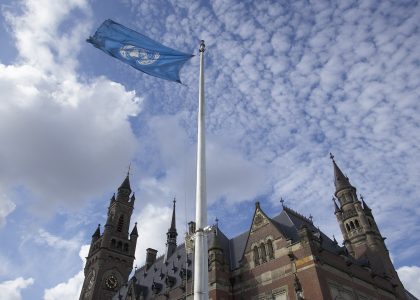Next week will see the official 9/11 museum open at the site of the World Trade Center in New York. Visitors to the museum will be able to learn about the attacks, their importance, and their victims through a combination of words, often highly personal artefacts and objects, and images. Despite some opposition, those visitors will also encounter the names and photographs of the 19 hijackers responsible for the attacks. In that sense, at least, visitors to the museum will have a quite different experience to those spending time at the 9/11 memorial plaza overhead. There, no mention at all is made of the attackers, much less of their motives.
The hijackers’ absence at the memorial plaza, and the anger of some at their naming in the museum beneath, are far from the only controversies to have surrounded this site. Yet, these controversies, I think, raise important questions about how ‘we’ remember those that are widely deemed ‘terrorist’ after their death. For instance, is there a moral duty to remember, or indeed to forget, the lives, violences, ideas and campaigns of people widely understood as ‘terrorist’? Politically, who gets to decide how, where, when and what memories of ‘terrorists’ are created? And, what about the differences between various memory genres or practices: do these matter at all in shaping how ‘we’ remember the ‘dead evil’?
‘Terrorists’ – and I use the scare quotes deliberately – are remembered in a variety of ways. In murals and music, slogans and speeches, on t-shirts and online, in fiction and film. All of these memory practices are recreations of the past for some purpose. And, all are important, I think, for three reasons at least.
First, memory works such as these help to frame the meaning of violent acts. Republican songs, for instance, celebrate the violence of martyrs. Reports of female suicide bombers, in contrast, frequently stress their marital status and family histories. Second, they also shape our sense of self, often by emphasising our own moral distance from the terrorist other. Descriptions of bin Laden cowering behind a woman, for example, contrasted so perfectly with celebrations of the heroic soldiers that killed him. Third, memory practices also arguably help to explain and legitimise ongoing political decisions. Criticisms of Zero Dark Thirty, you will remember, focused on its perceived justification of torture in the hunt for bin Laden. Whether we see such criticisms as valid or otherwise, engagements with ‘terrorists’ past influence and shape engagements with ‘terrorists’ present and future.
In a new article with Jack Holland, we try to explore some of these issues in relation to the Obama administration’s narration of the killing of Osama bin Laden. Our argument there is that the (re)telling of this story was characterised by two things. The first of these was considerable discursive continuity with the war on terrorism discourse of his predecessor President George W. Bush. This included, amongst other things, the demonization of bin Laden as a cowardly, cossetted terrorist and the celebration of the American military and political establishment. The second dynamic we identify is a gradual removal or ‘forgetting’ of bin Laden the man and the circumstances of his death from this unfolding story. This took place, first, via a stylistic shift toward ‘cleaner’ language and metaphorical description, and, second, through an increasing focus on the consequences – rather than the fact and details – of his death for the US and its constituent publics. Each of these dynamics – (i) continuity with or memory of the War on Terror, and (ii) discontinuity or forgetting in the (re)telling of this story – contributed, we argue, to the legitimisation of bin Laden’s killing. In the former, this took place via a return to the war on terror’s ethical certainties, especially in constructions of terrorism, heroism, cowardice and justice. In the latter, it occurred via a gradual de-emphasising of the administration’s responsibility for bin Laden’s death, and the legal and moral questions integral to this use of lethal force. This, we suggest, demonstrates the importance of narrative remembrance and forgetting alike for the conduct and justification of liberal violence.
Lee Jarvis is a Senior Lecturer in International Security at the University of East Anglia, UK. His books include Times of Terrror (Palgrave, 2009), Terrorism: A Critical Introduction (with Richard Jackson, Jeroen Gunning and Marie Breen Smyth, Palgrave, 2011), Cyberterrorism: Understanding, Assessment and Response (edited with Tom Chen and Stuart Macdonald, Springer, 2014) and Counter-Radicalisation: Critical Perspectives (edited with Christopher Baker-Beall and Charlotte Heath-Kelly, Routledge, 2014). For more on his current research visit his website or follow him on Twitter @LeeJarvisPols.





